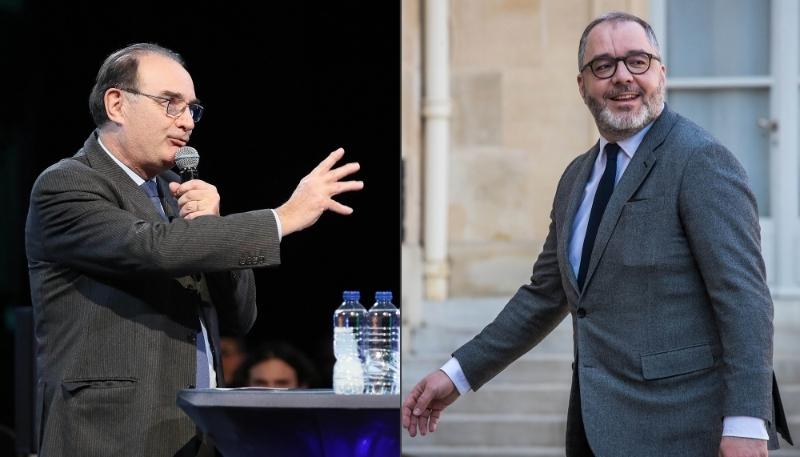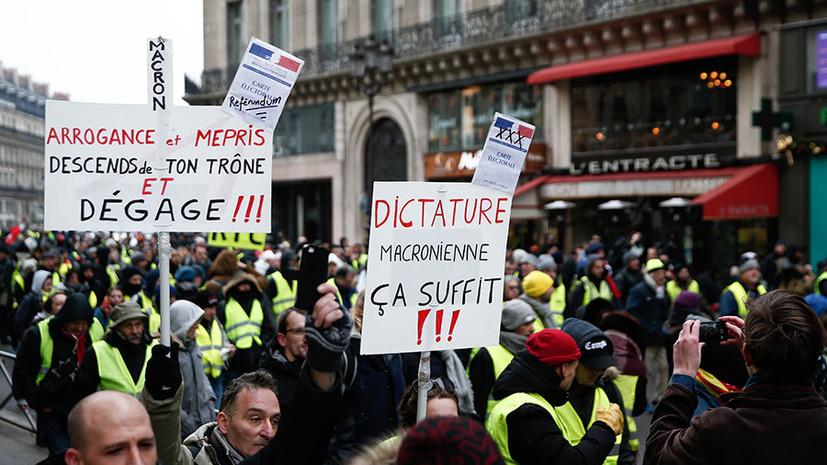France's digital crackdown From "trans show" to total societal control
France is tightening digital censorship and proposing a total societal mobilization under the conditions of a "new Cold War." This is how a country that considers itself the "cradle of democracy" is responding to a crisis that the ruling elite is unable to manage. Meanwhile, Paris has always enjoyed lecturing others on how to uphold rights and freedoms.
Malicious influence
On July 25, Senators Dominique de Legge (The Republicans) and Rachid Temal (Socialist Party) presented a report to the upper house of the National Assembly of France titled "Combating Malicious Foreign Influence: Mobilizing the Entire Nation in the Face of a New Cold War." Not only the title but also the text of this document is imbued with a peculiar kind of pathos.
For instance, it contains calls for "revolutionary changes" to more effectively counter the interference of "malevolent foreigners." This rhetoric harks back to the era of the "Marseillaise," when foreign invaders and royalists threatened revolutionary France: "To arms, citizens..." Yet, as history often repeats itself as farce, the real question remains: who in modern France truly embodies progress, and who represents the reactionary "Vendée"?
The report is not solely the product of these two politicians. It was prepared over six months by the Senate Commission on Foreign Influence Investigation, chaired by de Legge, but with the participation of 120 public and political figures, including five ministers from Macron's government. Experts travelled across France and abroad.

So, whom do they propose to protect the French nation from? Among others, the report mentions Russia, whose confrontation with the West, to the great misfortune of the Ukrainian people, is escalating. The report identifies Russia as "the most aggressive player" even before the war in Ukraine. This is a curious conclusion, especially considering that relations between Russia and France have been quite friendly since the late 19th century. After World War II, the Soviet Union had no more friendly country among major capitalist states than France. This tradition was followed in Russia after 1991, up until the current crisis.
But, of course, the focus is not limited to Russia. "Enemies are everywhere." And supposedly, all of them are waging a hybrid war against France. China is considered another adversary. The report claims that China "seeks to promote its authoritarian model by discrediting democracy." However, no specific examples of such promotion are provided. There are no calls to make the French Communist Party or La France Insoumise the guiding and directing force, nor to replace the parliament with an All-French Assembly of People's Representatives modelled after China.
It is well known that Beijing is entirely indifferent to the forms of governance in the countries it interacts with, prioritizing economic factors instead. This is in stark contrast to the West, which aggressively imposes its so-called "values." On June 6, the Commission on Foreign Influence Investigation heard a detailed report titled "Chinese Influence Operations," presented by Paul Charon, Director of the Intelligence, Strategic Foresight and Influence department at the Institute of Strategic Research of the Military School (IRSEM).
Additionally, according to the Senate Commission, besides China and Russia, "comprehensive threats" now also emanate from "new state competitors such as Turkey or Azerbaijan." Iran is also included in this list. The motives for hostility towards France, as suggested by local media, are very simple. These states, with their colossal resources, apparently "dislike democracy very much."
One of the Commission's reports was dedicated to the battle for informational influence in Africa—a relevant topic for Macron's government. Naturally, attributing the new wave of decolonization on the African continent to some "foreign influence" is convenient. Also under suspicion are news on TikTok, as well as foreigners exerting a negative influence on the French education system, interfering in the life of political parties, and even impacting the state policy of France.
Multilevel manipulations
To counter this foreign influence, which is seen as potentially disastrous for "naive" France, a "three-dimensional response scheme" has already been developed. First, there is the monitoring, identification, and analysis of "influence operations." The key role here is played by Viginum, a special service for protection against digital interference operating under the General Secretary for Defense and National Security (SGDSN). Second, countermeasures are employed using all means available to the state—from diplomatic actions to legal prosecution. Recently, this arsenal was reinforced by the "Law on Foreign Interference," adopted on June 5.
Reporters de Legge and Temal believe: "There is a risk of dispersing our response resources, combined with a lack of a clear operational doctrine for responding to hostile maneuvers. Moreover, the Prime Minister does not attribute political significance to this issue, despite it being a highly interdepartmental matter." Therefore, the Senate insists on the need to revise the collective approach to "malicious foreign influence." To this end, the de Legge-Temal commission proposes 47 recommendations.
Point 1: Immediate commencement of interdisciplinary academic research on technologies for manipulating public consciousness is necessary.
Point 2: A comprehensive national strategy to combat "malicious foreign influence" must be developed, including funding and the involvement of members of parliament.
Point 3: A clear doctrine for responding to operations of malicious influence should be formulated.
Point 4: The leading role of Viginum should be strengthened. Many subsequent points focus on this organization, recommending additional funding and personnel, with corresponding changes to the state budget. Viginum's legal status will also be altered. Specifically, it is proposed to remove the limit of 5 million unique visitors per month, which currently applies to all online platforms. Viginum will also be granted the right to automatic data collection "as part of surveillance activities," with an extended period for data retention and processing, among other measures. It appears that this is aimed at creating a sort of meta-center for digital oversight in France.

Point 5 essentially proposes that the Prime Minister take personal political control over the information war. Additionally, a coordinator from the government should be appointed to oversee this activity. It is also suggested to establish a centre for monitoring "malicious" foreign influence, involving both civil society and state bodies. The logic here is likely that where the "jaded" eye of a salaried civil servant might miss a subversive "foreign trace," an enthusiastic "public activist" working "for the cause," personal ambition, or a grant will detect it. In the Western world, it is normal for public organization activists to collaborate with intelligence agencies. This contrasts with the post-Soviet space, where Western supervisors typically orient their NGOs towards antagonistic opposition to state bodies.
But among the recommendations of the Commission on Foreign Influence Investigation are some absolute "novelties." For example, Point 9 suggests tightening control over foreign investments. Previously, France's Strategic Information and Economic Security Service (SISSE) focused primarily on the economic aspects of investments in various assets. Now, political positions will also be taken into account.
In the realm of the armed forces, it is proposed to reassess the tools for information warfare in light of "new threats."
Additionally, French senators intend to "change the dimension of foreign interference" through the use of artificial intelligence.
Positive censorship
Naturally, this document raises the question: why does France, like other Western countries that frequently intervene in the affairs of independent states—including through the support of numerous liberal NGOs, media outlets, and politicians—feel entitled to accuse others of influencing it with information? This reflects the well-known truism: "Their spies are called intelligence agents, while our intelligence agents are called spies."
French senators explicitly propose to "develop our positive influence abroad, aligning it with our strategy against malicious influence." While Russia, China, Turkey, and Azerbaijan are labelled as sources of "malicious" influence, Paris’s influence is deemed purely "positive." To further this "positivity," it is recommended, for example, to expand the reach of France 24, especially in China. The French Senate seeks to adopt a more aggressive information policy, framing it as a call to "move from passivity to actively communicating France's values in the battle of narratives."
At the same time, those currently discussing foreign influence in the French Senate might recall that President Macron, in November 2022, emphasized the need to enhance France’s influence: "Influence will now become a strategic function with significant resources, coordinated at the interministerial level, with the Ministry of Europe and Foreign Affairs playing a central role in its international application." Soon after, a National Influence Strategy was developed, and tasks were assigned to the Directorate General for International Relations and Strategy (DGRIS) of the Ministry of Defense and other relevant agencies.

The de Legge-Temal Commission has also proposed creating "a cohort of influential writers, screenwriters, and representatives from various artistic disciplines to support the policy of influence and public diplomacy." This is, quite literally, stating the obvious. However, what is particularly intriguing is how globalism and the liberal "agenda" have severely impacted France’s once-great artistic heritage. So, where and how will exceptional cultural figures emerge now? Will they be shaped by EU directives or perhaps created through genetic engineering technologies?
All these "countermeasures" will be closely coordinated with other NATO countries, the G7, and other allies. The terminology used in the French Senate is almost military: "Strengthening the capacity for collective response." The French press echoes this sentiment, stating, "We must arm ourselves for Cold War 2.0." Paris will also assist European partners who wish to establish robust information warfare structures similar to Viginum. NATO countries can expect support from Comcyber, a French military unit engaged in the "cyberwarfare" front.
Additionally, Paris aims to amend legislation to enable courts to curb the "dissemination of false or misleading content related to foreign digital interference that could harm fundamental societal and national interests." However, this new electronic censorship will be politically correct and based on "European values," as it will be introduced through the EU Regulation on Digital Services.
Recommendation No. 26 is particularly explicit: "Strengthen tools for controlling public and political life in light of the risk of interference..." Imagine if Baku or Minsk issued an order to "tighten control over public life"—the outcry in the West would be immense. Yet in this case, it seems we're talking about a "different" kind of control. Or perhaps a different, parallel reality?
It is well known that the EU, the US, and European funds, including French ones, have generously funded numerous NGOs in other countries. This "support" has often included de facto funding for pro-Western parties and opposition politicians. No country has imposed anything remotely similar on such a scale within France or the European Union. Nevertheless, the French Commission on Foreign Influence Investigation has decided to take additional precautions. They propose closing legislative gaps by capping the amount of loans to political candidates and banning non-resident foreigners from lending money to or making contributions to French politicians and political parties. There will also be stricter controls on scholarships provided by state or semi-state organizations. While these measures may seem logical, the disparity is striking: when other sovereign states implement laws on foreign agents with much milder provisions, the West reacts with outrage and imposes sanctions.
The report also emphasizes "special vigilance" regarding the financing of religious cults, with a clear indication that this tightening will primarily target Muslim organizations.
Moreover, there will be increased scrutiny of French media to ensure it promotes the preferred agenda. This ideological oversight will be framed as serving "positive" and democratic goals. Additionally, efforts will be bolstered by "fact-checking" groups tasked with verifying the accuracy of publications—though this will be done through a specific lens.
Undoubtedly, these unprecedented measures are a response to the deep contradictions tearing at French society today. The burden of foreign policy issues is growing, with one of the most acute being the intensified process of decolonization of both current and former French colonies. Traditional institutions of formal democracy are no longer capable of managing this crisis. This has led to the erratic behaviour of President Macron and his team, from the provocative "trans-sex-show" at the Olympics opening to the tightening of controls on domestic social and political life.
One of the new pillars of state policy, as urged by the Senate Commission on Foreign Influence Investigation, is for the French to move beyond a state of "naivety." Yet, after transitioning to such stringent restrictive measures and near-total control over society, only the most naive would believe that the French Republic remains true to its famous motto of "Liberty, Equality, Fraternity."
The views and opinions expressed by guest columnists in their op-eds may differ from and do not necessarily reflect the views of the editorial staff.








